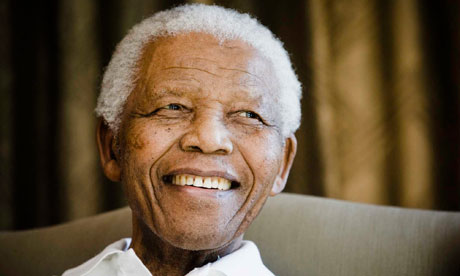One must go back to Dallas, Texas, in 1963 to find a comparable
occasion of collective bereavement as that which has met the death of
Nelson Mandela,
at the age of 95. Even the assassination of President John F Kennedy
registered less resonantly in the days before the global village – and,
in any case, the trajectory of the American politician's life
represented promise shattered rather than hope fulfilled.
Mandela
has surely been venerated by more millions in his lifetime than any
political figure in history. In working to free his country from racial
division, he led an essentially peaceful revolution, culminating in his
release from prison in 1990 and the post-apartheid election of 1994,
which saw him elected as the first president of a democratic South
Africa. The world responded to the qualities it perceived in the man, as well as to the scale of his achievement.
Was
he born to it, this child of royal descent? His uncompromising defiance
of a cruelly repressive government – as commander of Umkhonto we Sizwe
(MK), the Spear of the Nation – spoke loud. Was he a great general, or a
great politician, this herdsboy who became a president and more? Was he
a great orator? He did, after all, in his statement from the dock in
the Rivonia trial make one of the most memorable speeches in the annals
of political struggle. Or was his statesmanship what mattered, bringing
peace to a nation that seemed destined for bloody racial war? Curiously,
Mandela's greatness seems to have lain in all these things, and yet in
none of them.
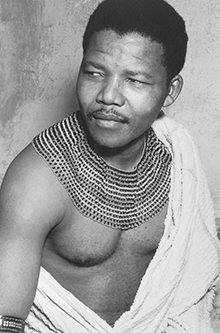 Nelson Mandela in traditional dress in 1950. Photograph: Apic/Getty Images
Nelson Mandela in traditional dress in 1950. Photograph: Apic/Getty Images
His birth, into the royal house of the Thembu people, was central to
the man. But as royalty goes, his place in Xhosa tribal society was
barely of the high-born. His father, Gadla Henry Mphakanyiswa, was a
descendant of a 19th-century tribal monarch, Ngubengcuka, but through
the so-called "left-hand house", which did not stand in the direct line
of succession. His mother, Nosekeni Fanny, was the third of four wives,
and Rolihlahla – "pulling the branch of a tree" or, more colloquially,
"troublemaker" – was the youngest of his father's four sons. "Apart from
life, a strong constitution and an abiding connection to the Thembu
royal house, the only thing my father bestowed upon me at birth was a
name," Mandela recalled in his autobiography, Long Walk to Freedom
(1994).
And African tribal monarchy was not European in form. "We
slept on mats, without pillows, resting our heads on our elbows,"
recalled one of Mandela's nine sisters, Nobandhla, in Fatima Meer's
biography Higher Than Hope. "Our mother's stove was a hole in the ground
over which she put a grate." As a child, Mandela was forced to wear his
father's hand-me-downs, cutting a comic figure in adult trousers
amputated at the knees and belted with a piece of string.
A
child's world is bounded by what they see. When Mandela was born at
Mvezo, near Umtata, 120 miles north-east of East London, in the native
reserve of the Transkei in the Eastern Cape, he was an aristocrat in his
small world, even if his first duty, aged five, after the family moved
to nearby Qunu, was as a shepherd. At the age of seven, he went to
school, the first of his family to do so. On that first day he was given
the name of Nelson to answer to; each child had to have an English as
well as an indigenous name; whether his teacher had the British naval
hero in mind in his case, he never knew.
He was nine when his
father died of a lung disease. According to Nelson's sister, Mabel, he
made a dying bequest to the Thembu regent, David Dalindyebo, giving
Nelson into his care. "I can see from the way he speaks to his sisters
and friends that his inclination is to help the nation," Mabel quoted
her father as telling the regent.
The bequest took Nelson to the
Thembu capital, Mqhekezweni, the "great place", where he became part of
the royal family, being treated by Dalindyebo and his wife as their own
child. "As a leader, I have always followed the principles I first saw
demonstrated by the regent at the 'great place'," Mandela recalled. "I
have always endeavoured to listen to what each and every person in a
discussion had to say before venturing my own opinion. Often times, my
own opinion will simply represent a consensus of what I heard in the
discussion."
Courage was also a prerequisite of tribal manhood. In
his autobiography, Mandela recounted, with pained humour, the story of
his circumcision – an ordeal that took place when he was 16. The
ingcici, the man making the cut, used an
assegai
(fighting spear) for the operation. The 26 boys sharing the rite of
passage sat naked on their blankets, legs splayed in front of them.
According to Xhosa tradition, when the blow was delivered, the victim
would shout
Ndiyindoda (I am a man!). "I was tense and anxious,
uncertain of how I would react when the crucial moment came," Mandela
recalled. To flinch, or cry out, would have been a sign of weakness. "I
was determined not to disgrace myself, the group or my guardian.
Circumcision is a trial of bravery and stoicism; no anaesthetic is used;
a man must suffer in silence."
The moment arrived, the old man
kneeling in front of him, face pale and shining with the perspiration of
a shared tension. "Without a word he took my foreskin, pulled it
forward and then, in a single motion, brought down his
assegai.
I felt as if fire was shooting through my veins. The pain was so
intense that I buried my chin in my chest. Many seconds seemed to pass
before I remembered the cry and then I recovered and called out: '
Ndiyindoda'.
"I
looked down and saw a perfect cut, clean and round like a ring. But I
felt ashamed because the other boys seemed much stronger and firmer than
I had been ... I felt distressed that I had been disabled, however
briefly, by the pain, and I did my best to hide my agony. A boy may cry.
A man hides his pain." Hiding his agony was to become a way of life for
Mandela.
In the family tradition, he was groomed to become a
counsellor to the future king, Sabata. He was sent to a Methodist
mission school, Clarkebury, 25 miles south-west of Umtata. The governor,
the Rev Cecil Harris, was the first white man he shook hands with. His
first day in class was also the first time he wore shoes. At 19, he
moved to another Methodist school, Healdtown, in Fort Beaufort, 175
miles south-west of Umtata, and then to nearby Fort Hare University
College, at the time
South Africa's
only black university, where he developed a close friendship with
Kaiser Matanzima. Ironically, Matanzima was later to be excoriated by
the world's anti-apartheid community as a "bantustan" leader – prime
minister of the Transkei homeland.
Mandela greatly enjoyed
university, particularly boxing and athletics, and, on the strength of
his first-year studies in English, anthropology, politics, native
administration and Roman-Dutch law, nursed an ambition to become a civil
servant and interpreter – about as high a position as a black man might
aspire to in those days. But his ambition seemed to be crushed when, in
1940, in his second year, as a member of the student representative
council he was expelled for his part in a rebellion over poor quality
food. He returned to Mqhekezweni to find another potential disaster – an
arranged marriage was being planned for him.
To escape the
nuptials, in 1941 he ran away to Johannesburg, where he landed a job as a
night watchman guarding the compound entrance of a goldmine. Equipped
with a whistle, a flashlight and a club, he had to stand next to a sign
warning "Beware. Natives crossing here", and check the identity of
everyone passing.
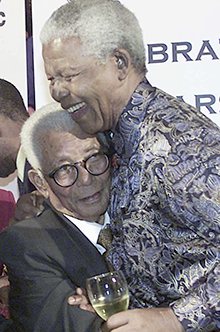 Nelson Mandela embracing Walter Sisulu in 2002. Photograph: Reuters Photographer / Reuters/Reuters
Nelson Mandela embracing Walter Sisulu in 2002. Photograph: Reuters Photographer / Reuters/Reuters
By this time Mandela had abandoned his dream of becoming an
interpreter in favour of a career in the law. A cousin introduced him to
the future ANC leader Walter Sisulu, then running an estate agency in
central Johannesburg. Sisulu took him to a local law firm, Witkin,
Sidelsky and Eidelman, with whom he did business, and they agreed to
take him on as a clerk while he completed a University of South Africa
BA by correspondence. "It was a Jewish firm, and in my experience I have
found Jews to be more broadminded than most whites on issues of race
and politics, perhaps because they themselves have historically been
victims of prejudice," Mandela observed.
At the office and at
Sisulu's home, he began mixing with more radical members of black
society. He also met his first wife, Evelyn Mase, a cousin of Sisulu.
She was a trainee nurse from the Transkei, four years younger than her
future husband. They married in 1944 and had two sons and two daughters,
both called Makaziwe, since the first died in infancy. The marriage
broke up in 1956 after Evelyn, a Jehovah's Witness, reputedly demanded
that Mandela choose between her and the ANC, and divorce followed in
1958. She died in 2004, and of their four children only Makaziwe
survives.
Mandela was always unable to pin-point when he first
became politicised, though his circle of white and radical friends
widened after he started a part-time law degree at the University of the
Witwatersrand in 1943. His first appearance on the political stage came
in 1944, with the launch of the ANC Youth League, a ginger group
determined to radicalise, or replace, the staid leadership of the ANC.
Mandela was a founder executive member.
Then, in 1948, the
exclusively Afrikaner Nationalist party won the whites-only general
election, and began to institute its policy of apartheid across South
Africa. In response, the ANC started looking for alliances with
communist and Asian groups to organise civil disobedience campaigns. By
then, thanks in large part to the youth league, the ANC had been
rejuvenated. Chief Albert Luthuli was president, Mandela his deputy. A
measure of his new prominence was that he got his first banning order.
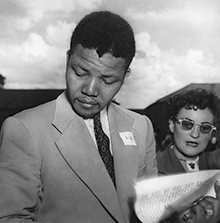 Nelson Mandela with fellow anti-apartheid activist Ruth First at an
ANC conference in 1951. Photograph: Jurgen Schadeberg/Getty Images
Nelson Mandela with fellow anti-apartheid activist Ruth First at an
ANC conference in 1951. Photograph: Jurgen Schadeberg/Getty Images
In August of that year, Mandela, having abandoned his LLB but now
qualified as an attorney, set up a law partnership with the man who
would stand in for him during the long years of imprisonment, Oliver
Tambo. The firm of Mandela and Tambo was South Africa's only partnership
of black lawyers, so its services were greatly in demand. But while the
two attorneys used their legal know-how to promote their political
ends, the failure of conventional campaigning to stop the removal of the
black population of the Johannesburg suburb of Sophiatown in February
1955 convinced Mandela that the ANC had no alternative but to take up
armed resistance: "A freedom fighter learns the hard way that it is the
oppressor who defines the nature of the struggle, and the oppressed is
often left no recourse but to use methods that mirror those of the
oppressor. At a certain point, one can only fight fire with fire." The
political objectives of this new urgency were defined in the Freedom
Charter, drawn up over two days in June 1955 by an ANC-led rainbow
alliance known as the Congress of the People.
The government,
however, pre-empted further action when, in December 1956, it arrested
Mandela and 155 other activists for high treason, on the grounds that
the charter implied communist revolution. During the two weeks before
her husband was released on bail, Evelyn and the children moved out of
the family home – Mandela was most shocked by the fact that she even
took the curtains. The state found difficulty making its case, and it
took until January 1958 before the magistrate committed 95 of the
defendants for trial at the Transvaal supreme court.
While the
hearing had a disastrous effect on his law firm, Mandela had the
consolation during it of meeting Nomzamo Winifred "Winnie" Madikizela.
They got married in June 1958, and in August he was back in court. The
prosecution was struggling to demonstrate violent intent and the trial
was still dragging on when, on 26 March 1960, 69 Africans demonstrating
against the pass laws were shot dead by the police in Sharpeville, 35
miles south of Johannesburg. By the time the trial ended a year later,
with the remaining 29 defendants acquitted, it had become a platform for
the declaration of ANC ideals.
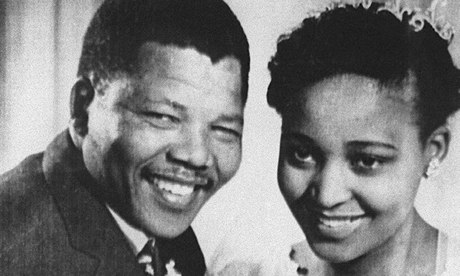 Nelson and Winnie Mandela pose for their wedding photo in 1957. Photograph: Off/AFP
Nelson and Winnie Mandela pose for their wedding photo in 1957. Photograph: Off/AFP
By then, Tambo had left South Africa to start an external wing of the
ANC, and the country was on the point of leaving the Commonwealth,
which was no longer willing to tolerate apartheid. Straight after the
verdict, Mandela went underground, earning himself a reputation as the
"black pimpernel" as he stayed one step ahead of the authorities. In
June 1961, he persuaded the ANC leadership to pursue a course of
violence, with himself as the head of MK, and immediately recruited
Sisulu and the white communist Joe Slovo to lead a force whose cutting
edge was a small group of explosives experts.
Part of Mandela's
time was spent on a farm at Liliesleaf, in Rivonia, a suburb north of
Johannesburg. Winnie brought him an old air rifle for target practice.
One day, he shot a sparrow with it and was mortified when the
five-year-old son of a friend rounded on him, saying: "Why did you kill
that bird? Its mother will be sad." "My mood immediately shifted from
one of pride to shame," Mandela recalled. "I felt that this small boy
had far more humanity than I did. It was an odd sensation for a man who
was the leader of a nascent guerrilla army."
Reluctant to cause
loss of life, MK first made its presence felt through explosions at
government installations in December 1961. In the new year, Mandela got
his first taste of the world outside South Africa, when he went on a
whirlwind tour of the continent, visiting Tanzania, Algeria, Ethiopa,
Ghana Morocco, Sierra Leone, Liberia, Mali and Egypt. He also spent 10
days in London.
Returning home, he was finally captured in August
1962, masquerading as a chauffeur. Speculation as to how the police
found him included claims that the CIA tipped them off. But there was an
amateurish quality to the ANC's operations at the time, and so several
possible explanations as to how he was betrayed. He was sentenced to
three years for incitement, and another two years for leaving the
country without a passport. Then, in October 1963, he was brought to
court again as the "number one accused" in the Rivonia trial, alongside
those ANC leaders arrested at the farm that July, and charged with
sabotage.
Looking back, it seems inconceivable that those accused
of treason at Rivonia could have been hanged, but such an outcome was
entirely plausible. A member of the Johannesburg bench privately claims
that he saved them by persuading the trial judge, Quartus De Wet, to
change his mind over a cup of tea in the judicial common room, just
before he returned to court for sentencing. De Wet, it seems, had been
set on hanging.
Many years later, in 1995, Mandela – delivering
the first annual lecture in memory of the Communist party leader Bram
Fischer, who was his defence counsel at Rivonia – drew roars of laughter
by recalling his dismay when he sought comfort from a friendly warder
on the eve of sentencing. Hoping to be contradicted, he told the man he
assumed it would be death – but the jailor just looked thoughtful and
agreed. "I ran and ran and ran [in the exercise yard] that day," he
recalled.
Despite this inner agitation, his determination to show
dignity in the face of the gallows almost invited the attentions of the
hangman. The draft of his now famous defence statement was returned to
him by apprehensive lawyers. They begged him to excise the last
paragraph, arguing that it was likely to antagonise the judge. But he
refused.
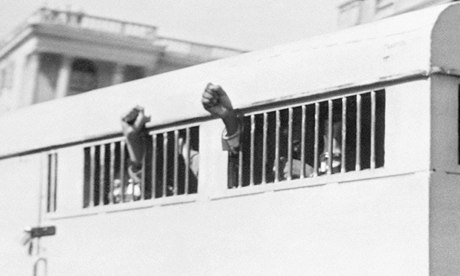 Eight men, including Nelson Mandela, sentenced to life imprisonment
in the Rivonia trial leave the court with fists raised. Photograph:
-/AFP/Getty Images
Eight men, including Nelson Mandela, sentenced to life imprisonment
in the Rivonia trial leave the court with fists raised. Photograph:
-/AFP/Getty Images
The reading of the statement took four hours. It denied foreign
influence or recklessness in settling on a programme of sabotage, and
emphasised the ANC's desire for a non-racial democracy. Mandela spoke
the last paragraph from memory, looking straight at De Wet: "During my
lifetime I have dedicated myself to this struggle of the African people.
I have fought against white domination, and I have fought against black
domination. I have cherished the ideal of a democratic and free society
in which all persons live together in harmony and with equal
opportunities. It is an ideal which I hope to live for and to achieve.
But if needs be, it is an ideal for which I am prepared to die."
His
handwritten notes to counsel, returned to him after his release from
jail 26 years later, show he was preparing a speech in answer to the
death sentence, in which he planned to say: "If I must die, let me
declare for all to know that I will meet my fate like a man." Instead,
he was sentenced to life imprisonment.
At the time, Mandela and
the ANC believed that the liberation of black South Africa could be
expected within a few years – the winds of change were already blowing
through the continent. Few anticipated just how long life imprisonment
would be for Mandela, and the stoicism that would be demanded of him.
His life was to have many gut-wrenching moments, when the fortitude of
his response to mental agony would have given pride to his tribal
elders. Perhaps the worst pain was emotional, the wounds caused by
separation from his family and the accompanying blows, such as the loss
of his eldest son, Madiba "Thembi" Thembekile, in a car crash in 1969.
Already
suffering guilt about the boy – "I shall look after the family while
you are gone," were the farewell words of the child when his father went
underground – Mandela received the news of Thembi's death by telegram
after five years on Robben Island. "I returned to my cell and lay on my
bed. I do not know how long I stayed there ... Finally Walter [Sisulu]
came to me and knelt beside my bed, and I handed him the telegram. He
said nothing, but only held my hand. I do not know how long he remained
with me. There is nothing one man can say to another at such a time."
Then
there was Winnie. The story of her peccadilloes is well known – her
love affairs and her part in a variety of suspected crimes, including
the murder of the 14-year-old township activist Stompie Moeketsi Seipei
in 1989. Mandela's private agony is difficult to encompass, though his
vulnerability is apparent in his prison letters.
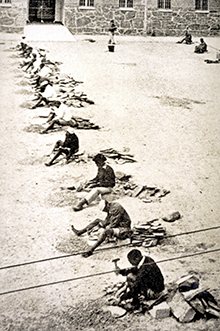 Line of prisoners including Nelson Mandela at Robben Island prison in the mid-1960s.
Line of prisoners including Nelson Mandela at Robben Island prison in the mid-1960s.
At first, he was allowed to write only two letters a year, building
up to two a month by 1981. They were subject, of course, to the prison
censor, but the agony over Winnie, and the passion of which that agony
was a product, blazes through them. "At my age, I would have expected
all the urges of youth to have faded away. But it does not appear to be
so," he wrote to her in 1979, after 15 years on the island. "The mere
sight of you, even the thought about you, kindles a thousand fires in
me." The battle with his emotions appeared never-ending. "I have been
fairly successful in putting on a mask behind which I have pined for the
family alone, never rushing for the post when it comes until someone
calls out my name," he told her three years earlier. "I also never
linger after visits, although sometimes the urge to do so becomes quite
terrible. I am struggling to suppress my emotions as I write this
letter."
Released on 11 February 1990, the following year he was
still struggling to keep the mask on – hands dug into a trenchcoat in
the public gallery of the Rand supreme court, staring impassively as his
wife was pilloried on kidnapping and assault charges relating to
Stompie's death. A six-year jail sentence was reduced on appeal to a
fine. It was not until his appearance before the same court – for his
divorce in 1996 – that it became apparent that the reservoirs of love
had finally run out. They had separated in 1992, and her appointment in
1994 as deputy minister of arts, culture, science and technology in his
government had ended in her dismissal within a year, amid allegations of
corruption.
With Winnie, Mandela had two daughters, Zenani
("Zeni") and Zindziswa ("Zindzi"), who survive him, and fortunately all
was not lost in his personal life. Soon after the divorce, he was
travelling in the company of Graça Machel, widow of the Mozambican
president and ANC ally Samora Machel, who had died in an air crash 15
years earlier. Marriage followed in 1998, on Mandela's 80th birthday.
Graça, too, survives him, as do 17 grandchildren and 13
great-grandchildren.
However, though Mandela finally found private
contentment, the mask had become integral to the persona, and not only
where Winnie and his family were concerned. An American journalist,
Richard Stengel, the ghostwriter of Long Walk to Freedom, recounted an
intriguing anecdote about the time he spent travelling the country
before the president-in-waiting came to power in the elections of 26-29
April 1994.
It happened at his country house in the Transkei in
April 1993, when Mandela was called to the garden to meet the local
police rugby team. He was busy shaking hands when his housekeeper ran
out, weeping, to say there was an urgent telephone call. Excusing
himself, he went inside, returning after several minutes to resume his
greetings to the players. It was only later that his aides discovered
the call had informed him that his close friend Chris Hani, the powerful
and popular Communist party leader, had been assassinated by a white
fanatic. It was the closest South Africa came to race war, and a
grievous personal blow. But Mandela went on shaking hands and smiling.
In
prison, stoicism was the only way to survive with his sanity intact.
Even when pressure from the outside world – most notably from US
corporations withdrawing investment – compelled the Nationalist party
government to look to a new settlement, progress was painfully slow. In
1985, President PW Botha offered freedom if Mandela "unconditionally
rejected violence as a political instrument". He refused this, the sixth
conditional offer of release in 10 years. But companies continued to
leave, and in a meeting with Botha shortly before he was succeeded by FW
de Klerk in August 1989, Mandela sensed a change of attitude.
Four
years later, he acknowledged De Klerk's courage in admitting that "a
terrible wrong had been done to our country and people through the
imposition of the system of apartheid" in his acceptance speech for
their shared Nobel peace prize.
After Mandela's release, his
stoicism proved a boon. South Africa – its black population, in
particular – desperately needed a figure of dignity to represent them.
Has there ever been a figure of greater dignity than the tall, slim,
stony-faced figure of Madiba (the clan name by which he was often
addressed), surrounded by the white generals who had fought so hard to
destroy his cause, taking the salute at the presidential inauguration in
May 1994?
At times, there were suspicions that the mask was all
there was to Mandela; that had his grasp of the situation been quite
limited, it would have made no difference to his reputation for
sagacity, such was the mystique surrounding him. There may be some
grounds for this scepticism. His incarceration was, in a way, a blessing
for his political reputation. He was plucked from the political arena
after making a resounding, if obvious, statement of truth at the Rivonia
trial, which was reiterated endlessly on his behalf during his
imprisonment. A reputation for wisdom must accrue to a politician who
has been consistently proven right for more than quarter of a century.
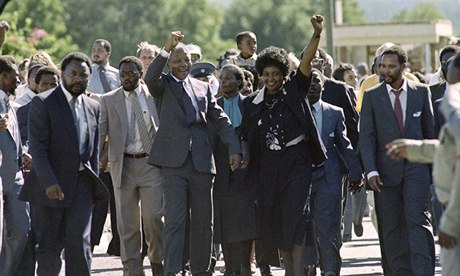 Nelson and Winnie Mandela acknowledge the crowds cheering his
release from prison on 11 February 1990. Photograph: Alexander
Joe/AFP/Getty Images
Nelson and Winnie Mandela acknowledge the crowds cheering his
release from prison on 11 February 1990. Photograph: Alexander
Joe/AFP/Getty Images
So what lay behind the mask? The record after his release suggests
there was a certain naivety about Mandela, born of tutored ignorance,
the product of imprisonment and deliberate isolation. His unforgettable
walk through the gates of Victor Verster prison, 35 miles north-east of
Cape Town, was, in a sense, a rebirth. Welcomed into an alien society,
he looked about him with wide-eyed wonderment. (At one stage, he thought
that a television sound-man waving a boom microphone at him was
wielding a fancy assassination device.)
His sense of naive
wonderment was there in his enthusiasm for Elizabeth Taylor – her image
etched bright in his mind by seeing the film Cleopatra in a rare moment
of official entertainment on Robben Island – and his enjoyment of the
Miss World competitions staged in South Africa in the 1990s. Even his
boyish welcome to the Queen at Cape Town docks in 1995 suggested a man
long preserved in aspic – only such enthusiasm could account for him
being one of the few men who could get away with calling her Elizabeth
to her face.
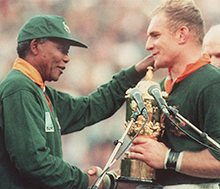 Springbok captain Francois Pienaar receives the Rugby World Cup from
Nelson Mandela in 1995. Photograph: Philip Littleton/AFP/Getty Images
Springbok captain Francois Pienaar receives the Rugby World Cup from
Nelson Mandela in 1995. Photograph: Philip Littleton/AFP/Getty Images
It is worth remembering that when Mandela went to jail, Kennedy had
yet to deal with the Cuban missile crisis and the Beatles were still to
release their first hit. On the other hand, the enthusiasm of the inner
child that survived from this earlier age could chime with that of the
legion of South African sports fans – Afrikaners not least among them –
as when the country hosted the 1995 rugby World Cup. Mandela wore
captain François Pienaar's number six jersey for the final, went down on
to the field, and the crowd loved it. A poignant echo of that moment
came at the soccer World Cup final of 2010: while he still thrilled
spectators by smiling and waving from a golf buggy, they knew that he
had suffered the loss of his 13-year-old great-granddaughter Zenani
Mandela in a car crash after a concert at the start of the month-long
event.
Sometimes Mandela was like a stage magician, forced to
perform by his followers' passionate belief that he was the real thing.
At times, the magic did not work, as at the King's Park stadium, Durban,
shortly after his release from jail, when he appealed to his audience –
protagonists in the KwaZulu-Natal civil war – to throw their spears and
guns into the sea. Woodenly going through the motions of rhetorical
appeal, he lost the crowd, who knew, as he did, what was happening.
Perhaps
this need to demonstrate charisma explained his attachment to the
glamour of the very rich. For the boy in ragged trousers, who had to
struggle right up to the time De Wet removed him from the world of
financial responsibility, money was dazzling. Hence, once freed, he
holidayed at the Irish businessman Sir Tony O'Reilly's Caribbean island
and gave the go-ahead for his takeover of South Africa's biggest
newspaper group, in anticipation of his "magic money" providing black
empowerment in the media.
He allowed the casino king, Sol Kerzner,
to host the wedding of his daughter Zinzi. He borrowed rich men's
houses and flew around South Africa in their aircraft. In speeches, he
often used to boast of his ability to milk wealthy businessmen for good
causes. But, at times, there was suspicion as to how "good" – or, more
specifically, how independent of his own interests – the causes were.
One
person who seemingly had such concerns was the former opposition leader
Frederik van Zyl Slabbert, who described in his memoir, The Other Side
of History (2006), how Mandela had asked him for a large donation from
the philanthropist George Soros for his African peace initiative.
"I
pointed out to [Mandela] that he would have to be slightly more
specific, otherwise Soros would not respond," recalled Slabbert. "He
asked me to try in any case. When I contacted Soros, his reply was: 'I
do not sign blank cheques.' I was in a difficult spot, but went to
Mandela and as gently as possible suggested he gave content to his
request, eg the travel, accommodation and salaries of two to three top
executives ... I recall the smile freezing on Mandela's face, and his
eyes going hard. That was the last time he talked to me about raising
money. In fact, it was the last time he talked to me one-on-one in a
personal, friendly manner."
In Mandela's later years, the
fund-raising schemes he was seemingly inveigled into bordered on the
tawdry – the attempts to market golden replicas of his hand; his
emergence in 2003 as a talented painter, capable of dashing off
entrancing views of Robben Island (with a little help from Vareenkas
Paschkea, a 26-year-old art teacher and granddaughter of PW Botha); the
twinning of his name with that of Cecil Rhodes, through the merging of
the Rhodes Trust and the Nelson Mandela Foundation into the Mandela
Rhodes Foundation in 2002.
His naivety in raising funds abroad
came closest to betraying the high principles with which his name is
associated. The friendship with Indonesia's President Sukarno seemingly
originated in large donations to ANC funds; the millions slipped to the
liberation movement by Taiwan were linked to holding out on the
two-Chinas issue. The policy of constructive engagement with the
Nigerian military junta – which possibly contributed to the execution of
Ken Saro-Wiwa and his eight comrades – was not unconnected with gifts
to the ANC.
In the 1980s, it emerged that the Mandela name was the
subject of a deal that Winnie was negotiating with an American
businessman, Robert Brown, in order to exploit it commercially as a
trademark. Her move was widely criticised as evidence of personal greed.
But
Nelson, too, sought such a deal. From affidavits before the
Johannesburg high court in the Mandela v Ayob case in 2007, involving
allegations that the family lawyer, Ismael Ayob, had pocketed some of
Mandela's money, it emerged that after what was known as the Tinancier
agreement had been signed by Mandela, transferring a wide range of
copyrights to a company owned by Ayob, he registered eight variations of
his name as trademarks. Subsequently, he was in the process of closing a
deal with an Afrikaner businessman, Douw Steyn, by which Steyn would
have been able to exploit the Mandela name in the marketing of a game
farm. The ANC leader would have received 20% of the profits.
When
this deal collapsed for legal reasons, Mandela approached a group
of wealthy businessmen for donations to support him and his family. A
trust fund was set up, and between September 16 2002 and March 10 2005,
it received 18.5m rand (about £1.7m). There does not appear to be a
charitable dimension to this fund outside the Mandela family.
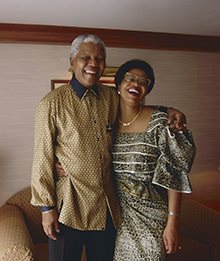 Nelson Mandela and Graça Machel on the Queen Elizabeth 2 ocean liner. Photograph: Louise Gubb/Corbis
Nelson Mandela and Graça Machel on the Queen Elizabeth 2 ocean liner. Photograph: Louise Gubb/Corbis
Nonetheless, Mandela considered himself a man of the world. He
display- ed no signs of personal avarice; he cut his presidential salary
when he came to power, and lopped off a further third of it as a
regular donation to a children's fund. Prison, one sensed, had imbued
him with an understanding of the irrelevance of personal possessions.
His fundraising activities were always for the sake of others,
pre-eminently for his people and the ANC, to which he gave intense
loyalty as the vehicle of liberation. It was a cause important enough to
justify compromises, but the sense of principle, the attachment to
ideals – if not precisely the honouring of them – was always there.
Mandela
was a flawed man, as all men are flawed, and in the face of this one
struggles to discover the roots of his greatness. He was certainly
courageous, though he arguably failed his family, in more ways than one –
by his first wife's account, he even tried to throttle her on one
occasion. One of his sons never visited him in prison and the other
rarely wrote, both seemingly feeling a sense of betrayal. And then, of
course, there was Winnie, for whom he carried some burden of guilt, even
if he was the one who divorced her.
There was, too, Winnie's
advocacy of "necklacing" – execution by burning, with tyres around the
victim's neck – which was hugely damaging to South Africa's liberation
struggle. It was used primarily against alleged informers and public
functionaries seen as collaborators, but other victims included people
held guilty of minor infractions of community solidarity, such as
breaches of a consumer boycott, and old women held to be witches.
South
Africa's truth and reconciliation commission has estimated that more
than 400 people were killed by necklacing. In its final report, it
observed that "although the official policy of both the UDF [the
broadly-based United Democratic Front] and the ANC was to condemn
necklacing, the public statements of the leadership of these
organisations were sometimes ambiguous and appeared to give tacit, and
sometimes overt, approval to the practice."
It has been long
assumed that Mandela, in prison, would have strongly condemned
necklacing. Indeed, it was reported, and widely believed, that after
Winnie had raised the issue – in 1986, when she declared that South
Africans would liberate themselves with matchboxes and tyres – her
husband had summoned her to Pollsmoor prison, in Cape Town and
reprimanded her for it. It has emerged, however, from a document that
circulated among journalists and academics in South Africa, and which
finally dribbled into print in 2005, that Mandela condoned his wife's
statement. The document, the minutes of a meeting between Mandela,
Winnie and Ayob inside Pollsmoor prison, said: "NM approved of WM's
necklace speech. He said that it was a good thing as there has not been
one black person who has attacked WM."
(...)
As
a speaker, Mandela was no Churchill. Other than the Rivonia defence,
few of his utterances will stand the test of time. His command of MK was
brief, and notable for little more than the arrest of the high command,
including himself. The incompetence of the ANC government in South
Africa under his leadership – while understandable in the light of
ministerial inexperience and the sabotage of their efforts by the old
guard civil service – offered little testament to his administrative
abilities. Arguably the single most significant contribution he made to
the governance of South Africa during his presidency was his decision to
stand down in 1999 after one five-year term, a gesture intended to
discourage his successors from extending their time in office beyond the
limits allowed by the constitution.
One suspects that this move
came as something of a relief to the ANC leadership, who spent much of
their time assuring the media that Mandela's presidential policy
announcements – such as his intention to extend the franchise to
14-year-olds – were not to be taken seriously. Mandela himself conceded
in retirement that his government should have paid greater attention to
the HIV/Aids epidemic. When his son Makgotho died from the disease in
2005, Mandela announced the fact openly, and called for the fight
against it to be redoubled.
It was also an open secret that Thabo
Mbeki was running the government from behind the throne, buoyed up by
the international goodwill attracted by Mandela. Mandela's presidency
was spent doing little more than playing host to the celebrities and
politicians who flooded into the country to shake the great man's hand.
One suspects that he seized on the suggestion that he stand down after a
single term with relief at the prospect of escaping a job that was
little more than a burden.
Mankind has become used to discovering
its heroes have feet of clay, and in Mandela's case, much can be
explained away by the single fact of his incarceration. How could
anyone, cut off from the rest of humanity for more that a quarter of a
century, be anything but unworldly, particularly in the handling of
money? And it should be remembered that the necklacing remark was made
in emotional circumstances, in the context of a prison visit by a woman
with whom he was then desperately in love. At the same time, it does
raise questions about the judgment of a man the world has come to know
as a political saint.
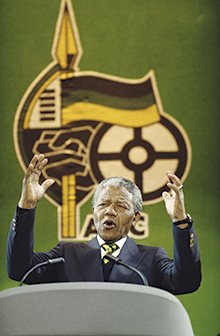 Nelson Mandela at a concert at Wembley Stadium in 1990 to celebrate
his release from prison. Photograph: Georges Dekeerle/Getty Images
Nelson Mandela at a concert at Wembley Stadium in 1990 to celebrate
his release from prison. Photograph: Georges Dekeerle/Getty Images
So why use the word great? Perhaps it was Mandela's appreciation of
politics as theatre, combined with his talent as the great conciliator.
Many will have their own stories of the "Madiba magic" at work. For this
writer, it was a small episode that took place on the steps of the
civic centre, under a fluttering flag of the Boer republic, in a dusty
village in the middle of the giant scrubland known as the Karoo. The
date was 15 August 1995.
The place was Orania, Northern Cape, the
last refuge of the Afrikaner fundamentalists who fled the approach of
modernity with the great trek of 1835-42. The occasion was a tea party.
Mandela was the guest, the host was Betsy Verwoerd, the 94-year-old
widow of the notorious President Hendrik Verwoerd, whose killing in 1966
had brought no pleasure to his opponents imprisoned on Robben Island –
in Long Walk to Freedom, Mandela asserted that neither he nor the ANC
had ever supported political assassination. One moment of that
extraordinary meeting stands out for me, overwhelming all the other
extraordinary events of post-apartheid South Africa.
It came as
Betsy, bereft of her glasses, struggled to read a statement to reporters
gathered on the steps of the community hall. Mandela,
sotto voce,
prompted her in Afrikaans, reading over her shoulder. Once finished,
she smiled her thanks up at the black man towering over her. He smiled
fondly back.
To appreciate that moment, one needs a particular
understanding of the South African story. To the world, South Africa has
long been literally a black-and-white issue, the goodies and baddies
easily identifiable by the colour of their skin. But that was always an
over-simplification, qualified from the early days of the anti-apartheid
struggle by the likes of Fischer, the Rev Beyers Naudé and Slovo, and
compromised more recently by the reform movement under De Klerk, who saw
the necessity of letting Mandela take the country forward in the
election of 1994.
Another way of understanding South Africa is to
recognise it as something of an Old Testament story, a tale of people
struggling to do right by their gods and failing time and time again. In
the second half of the 20th century, these people, exhausted by the
struggle with themselves and against one another, had need of a unifying
figure to give them a vision of nationhood.
Mandela saw the need,
donned the mask that the role demanded and gave his life for his
people. There lies his greatness, and hence the tears that flow at his
death, in a much beloved country.
• Rolihlahla Nelson Mandela, statesman, born 18 July 1918; died 5 December 2013

